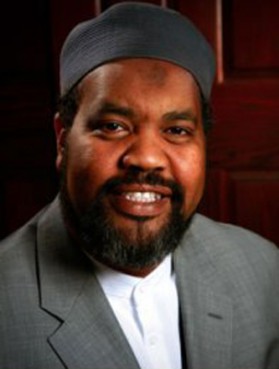
(RNS2-NOV03) Imam Mohamed Magid is president of the Islamic Society of North America. For use with RNS-10-MINUTES, transmitted Nov. 3, 2010. RNS photo courtesy ISNA.
(RNS) Imam Mohamed Magid assumes the helm of the Islamic Society of North America, the largest Muslim group in the U.S. and Canada, at a time of unprecedented hostility and suspicion against U.S. Muslims.
Changing those perceptions is the first priority for the Sudanese-born Magid, 45, who has earned high marks as an outgoing bridge-builder who heads the All Dulles Area Muslim Society, a congregation of 5,000 families in Sterling, Va., just outside Washington, D.C.
Magid succeeds Ingrid Mattson, a soft-spoken but unflappable Hartford Seminary scholar who was elected as the group’s first female and first convert president in 2006.
Some answers have been edited for length and clarity.
Q: What are the biggest priorities over your two-year term?
A: The misunderstanding and misconception that have been created about Islam and Muslims. We hear every day somebody mischaracterizing Islam in the media. There is a lot of damage from all the negative images of violence and extremism seen around the world.
The other priority is to have the Muslim American community establish for themselves a clear understanding of what it means to be an American Muslim. I want to indigenize Islam in America and to help second-generation Muslims have a place at the table in Muslim organizations.
Q: Why do you think anti-Muslim sentiment in America is growing?
A: We’ve been used like a scapegoat, and that is very troubling. But I always have hope in America. America has overcome so many issues like this before, and because you’ve had voices of reason responding to people demonizing and attacking Islam and Muslims.
The only thing that I can say to the Muslim community is: stand-firm, don’t over-react. Hate can’t be a response to hate. Only love can overcome hate.
Q: A lot of people say Islam and democracy are not compatible. How do you
respond?
A: Islam believes in protecting human dignity, human honor, human life. Muslims should always advocate protecting freedom of religion, protecting human life, protecting property. All of these are inherent principles in Islam. Muslims should celebrate democracy.
It bothers me when Muslims don’t apply these democratic principles in countries with Muslim majorities. It bothers me when Muslims attack minority Christians or don’t allow them to practice. I want to hold Muslims who are not living in the West accountable to those principles.
Q: What are some ideas you have to combat the radicalization of Muslims?
A: The violent extremists propagate a narrative of Islam that is not true so we’re looking into the theology of the violent extremists, and deconstructing it.
We’re using practical programs to engage young people. We try to teach them that the way you dispute with a government is with political discourse. You don’t listen to violent extremists who try to take you to Pakistan or Afghanistan or Somalia to engage in violent activities.
Q: You’ve said you also want to increase Muslim education about the Holocaust. How is that going?
A: We went to Poland and Germany, where I saw first-hand what happened to the Jewish community and what happened to others in the Holocaust. And I can tell you it’s beyond imagination.
I don’t know why those who are vocal about denying the Holocaust would deny a crime like this. Muslims have to stand for justice, and not bear false witness and deny something like this.
Q: What do you plan to do in terms of women’s issues?
A: We want more women in the ISNA membership, and ISNA leadership. Muslims have contributed to the misunderstanding about the role of women in Islam through their behavior, and sometimes through the literature, but in every religion you have misconceptions like that. But the majority of American Muslim women are professionals, are highly educated and are wonderful contributors to the well-being of Muslim communities in America.
Q: Did Ingrid Mattson give you any advice?
A: She wanted me to continue the diversity of the organization, to continue to reach out more to different ethnic groups in the community, to involve more women in ISNA. And she said you have to know the value of time.




